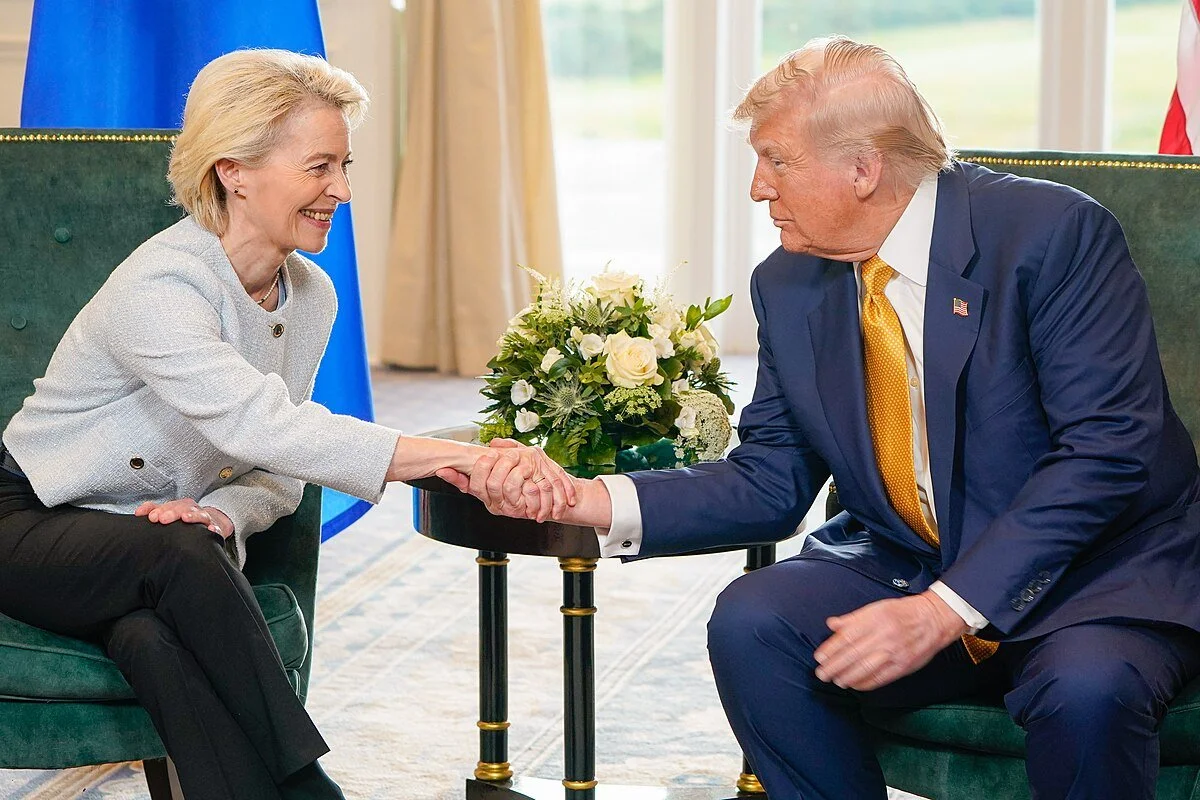Flattery and Strategy: How European Leaders are Responding to a New Era of Trump
By Liam Smith | 12th of November, 2025 | 4 min
Meeting between Ursula von der Leyen, president of the European Commission, and Donald Trump, President of the United States, on the 27th of July 2025 in Scotland.
Donald Trump’s 2024 re-election as President of the United States has ushered in a new era in US-Europe relations. In his second term, Trump seems to have begun to truly act on his protectionist and isolationist promises. In July of this year, the United States and the European Union agreed to a trade deal that imposed a 15% tariff on the majority of EU imports.
The President of the European Commission, Ursula von der Leyen, spoke positively of the deal, heralding Trump’s “personal commitment and leadership,” despite the fact that the EU was not given the opportunity to impose equal reciprocal tariffs on the United States. Von der Leyen’s praise of the US president poses the question: How are European leaders responding to Trumpism? Are they adjusting their rhetoric and policy decisions to appeal to a president, often described as ‘unpredictable’ and ‘erratic’?
Trump has also demonstrated his wariness towards Europe, previously accusing the European members of NATO of “screwing” the US on trade and not making sufficient financial contributions to the organisation. Mark Rutte, the current Secretary General of NATO and former Prime Minister of the Netherlands, seems to be aware of Trump’s resentment towards the European members of NATO, and has attempted to respond to this by ‘buttering up’ the president. Shortly after the United States airstrike on Iran, Trump published a private message from Rutte, in which Rutte appeared to zealously praise Trump’s “decisive action,” effusively writing that the strike was “something NO American president in decades could have done.” Yet, Rutte is not a far-right Trump ally, he led a relatively moderate government in the Netherlands, and as the Secretary General of NATO is a proponent of global collaboration rather than national protectionism.
Both Von der Leyen and Rutte’s praise of Trump, a president with whom they are not particularly politically aligned and who has criticised the institutions they serve, may indicate that European leaders are strategically leveraging flattery to navigate diplomatic relations with the United States. It is clear that Trump wants to detach the US from Europe, both economically and militarily. It appears that rather than taking retaliatory measures, European leaders are making concessions and playing to Trump’s ego to maintain a positive diplomatic rapport.
Nonetheless, the flattery goes beyond rhetoric and public statements. Europe’s leaders have seemingly doubled down on reliance on the US, rather than attempting to improve European independence. For instance, earlier this year, most European leaders were content to finance a $100 billion deal for Ukraine to purchase American weapons instead of trying to strengthen the European arms industry. In a sense, European politicians seem satisfied to perpetuate Trump's narrative that Europe depends on the United States. This arms bid, much like the tariff agreement, abases European economic interests, while strengthening the US economy, in another act of deference to the American President.
While European leaders are ostensibly appealing to Trump’s ego and “America first” agenda to secure US-Europe collaboration, the response to Trump and his allies within the European Parliament has seemingly taken a different form. In early September, President of the European Parliament, Roberta Metsola, declined to hold a minute of silence for Charlie Kirk, an American conservative influencer who had been killed shortly before. Kirk was a staunch supporter of Trump, who in turn, has referred to Kirk as “a great American hero”. The rejection to hold the minute of silence has drawn criticism from far-right MEPs who banged on their desks and shouted in the European Parliament when the decision was first made.
This action by the President of the European Parliament seems to contrast other leaders’ pandering and flattery. It should also be noted that Metsola is part of the same overarching political camp as the aforementioned leaders Von der Leyen and Rutte, thus her refusal is not easily attributable to personal political motivations. Instead, what this rejection may indicate is an internal resistance to appeal to Trump and Trumpism. While Rutte and Von der Leyen may attempt to ingratiate Trump in diplomatic ambits, such ingratiation has little place in the internal affairs of the European Union, such as a plenary of the European Parliament. Trump would have certainly supported an initiative to hold a minute of silence in the EP, yet, pandering to his desires does not seem to be necessary when the interests at stake are merely internal to the EU.
European leaders’ efforts to stroke Trump’s ego and appeal to him personally seem to be merely tactical, used as measures to ensure Trump does not act on his Euro-scepticism. Rather, these efforts appear to be somewhat disingenuous, as when prying a level deeper into internal affairs, there seems to be little room for such cajolery.
Liam Smith is a second year Bachelor student at Bocconi University studying Global Law.


